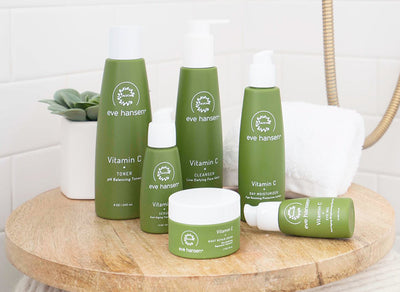
We’ve all been there. Irritating, persistent, temperamental…dry skin often feels like a problem that will just never go away. While dry skin can sometimes manifest as a symptom of a more serious skin condition such as eczema or rosacea, dryness can also be the result of improper care. Step one: let’s target the problem!
Dryness or dehydration? One of the most common misconceptions when it comes to ‘dry skin’ is that dry and dehydrated skin are one in the same. Au contraire mes amis! Rather, these are two distinct problems must be addressed differently. While dehydrated skin lacks water, dry skin actually lacks oil.
Step two: Hydrate inside and out! When the skin’s outermost barrier is compromised by the rigors of our everyday, moisture can be easily lost. Unfortunately, drinking enough water isn’t always enough to leave our skin looking and feeling its best. Harsh soaps, hot showers, product misuse, overexposure to sun and other environmental factors can impair the skin’s ability to retain moisture. By integrating a natural humectant such as honey, aloe and/or hyaluronic acid into your skincare routine, skin is better able absorb and retain the moisture it needs. The resulting firmer, fuller and better-hydrated skin will reduce the appearance of fine lines and wrinkles while helping you radiate with beautifully healthy and hydrated skin.

Now, let’s talk about oil. Oil can often be a confusing topic when it comes to skincare as one might never be sure if we’re putting it on our trying to take it off. The answer? Both! In order to properly understand how to fix dry skin for good, we must become familiar with sebum. Sebum is an oily substance produced by the sebaceous glands in the skin that helps to naturally nourish and protect the epidermis. While those with oily skin may have an overabundance of sebum production, dry skin is often the result of a lack of this naturally occurring substance.
Step three: Targeted nourishment! Whether your skin is oily or dry, we all want properly nourished and moisturized skin. The key is to choose products to suit our specific skincare needs. Certainly, skincare isn’t one size fits all. While synthetic products can worsen the problem, moisturizing with the right natural oils can increase moisture and help to stimulate the skin’s natural sebum production. Luckily, we’ve included a list below of some of our favorite natural oils to help you moisturize correctly.
Happy hydrating and moisturizing!
Castor Oil
One of castor oil’s many benefits is that it is a highly effective moisturizer. It’s high concentration of fatty acids allow it to quickly absorb into the skin and act as an emollient for dry and flaky patches. The linoleic acid content in castor oil creates a barrier for skin that prevents the loss of moisture.

Rosehip Oil
Rosehip is by far one of our favorite moisture replenishing ingredients. Filled with all the necessary fatty acids, omegas and nutrients to properly nourish skin, rosehip’s benefits extend far beyond just moisturizing. This oil deeply penetrates the skin to repair and reverse damage caused by a variety of factors.
Argan Oil
The power behind argan oil is in its high levels of Vitamin E – the ultimate moisturizing and skin-repairing ingredient. Aside from moisturizing, vitamin E helps fend off free radicals, accelerate the healing of scars, and improve the appearance of damaged skin tissue. Argan oil is an ideal product to give sensitive skin a hydration boost because it absorbs easily, is non-greasy, and non-irritating.

Jojoba Oil
What's interesting about jojoba oil is that it very closely resembles human sebum, making it effective for most skin types and conditions. This emollient oil works by forming and oily layer on top of the skin to trap water in the skin. Jojoba oil also works to balance the skin’s oil levels, making it both a natural treatment to relieve eczema as well as a home remedy to reduce acne. (After you’re done treating your skin, we recommend using some jojoba oil on your hair for added shine and softness!)


